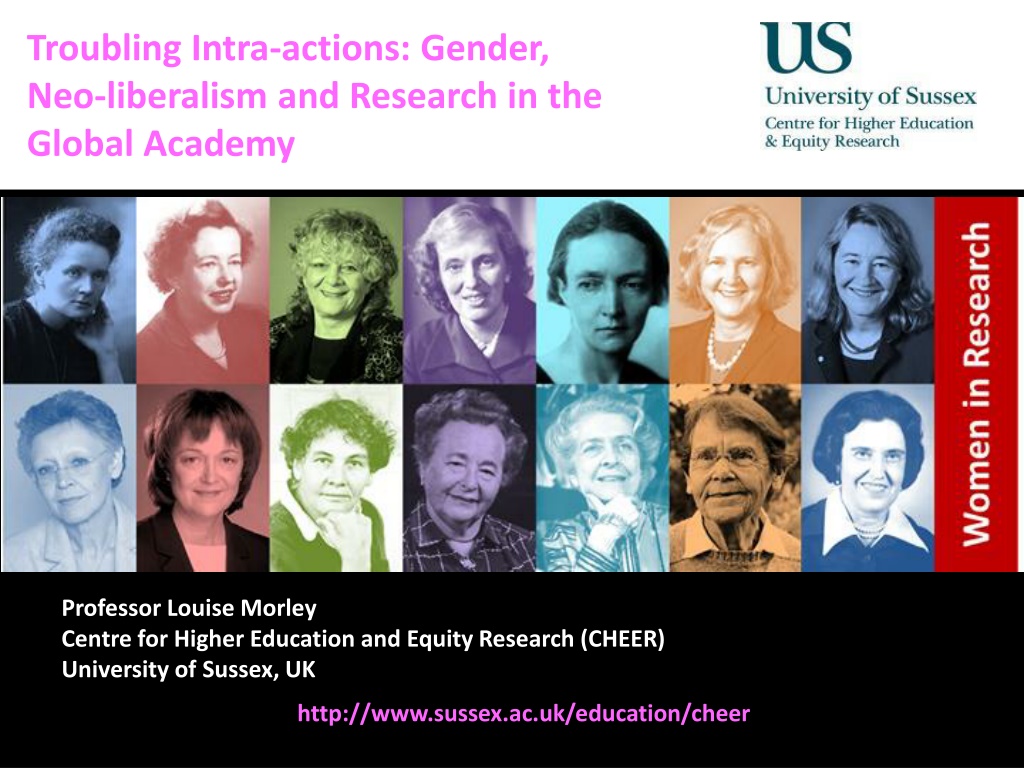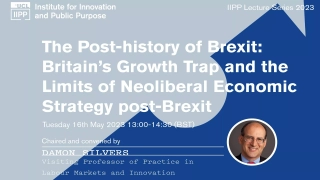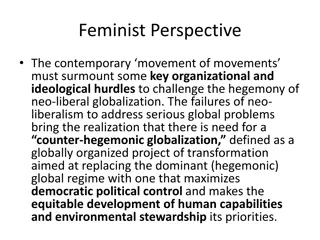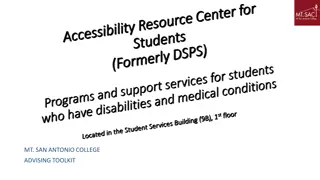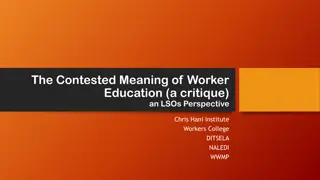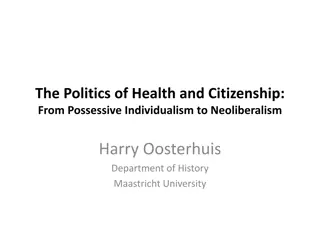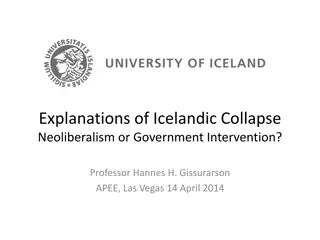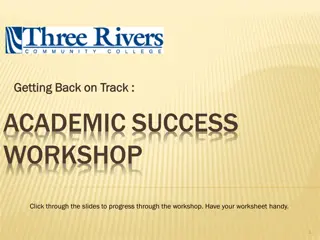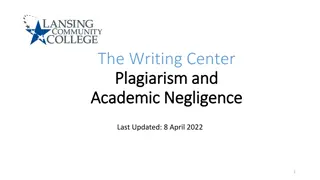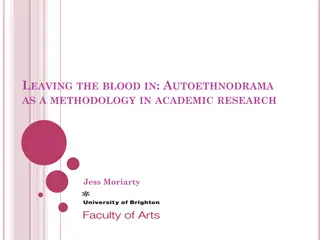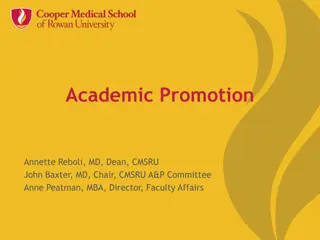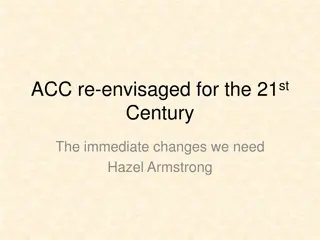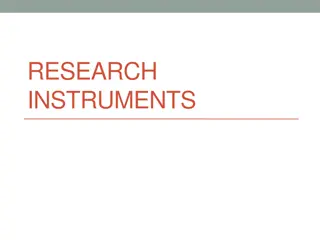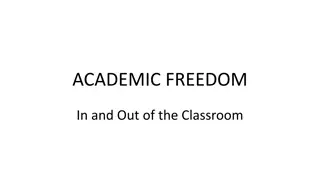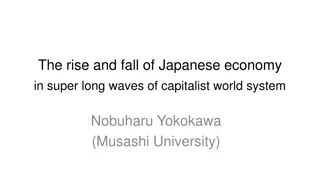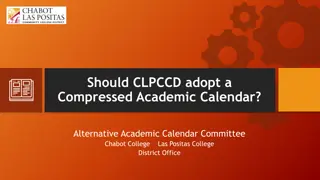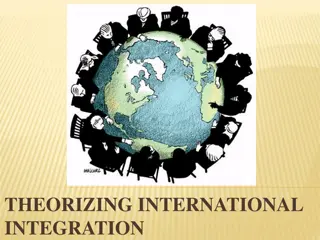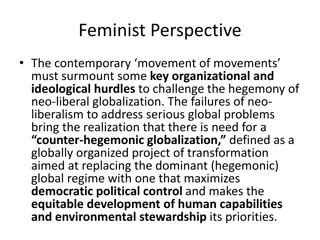Challenges of Neoliberalism in Academic Research
Professor Louise Morley explores the impact of neoliberalism on academic research, focusing on issues like financialization, gender biases, and the affective economy. The discussion delves into the entanglement of research with neoliberal ideologies, questioning the prioritization of market values over criticality and scholarly independence.
Download Presentation

Please find below an Image/Link to download the presentation.
The content on the website is provided AS IS for your information and personal use only. It may not be sold, licensed, or shared on other websites without obtaining consent from the author.If you encounter any issues during the download, it is possible that the publisher has removed the file from their server.
You are allowed to download the files provided on this website for personal or commercial use, subject to the condition that they are used lawfully. All files are the property of their respective owners.
The content on the website is provided AS IS for your information and personal use only. It may not be sold, licensed, or shared on other websites without obtaining consent from the author.
E N D
Presentation Transcript
Troubling Intra-actions: Gender, Diversity, Democratisation and Difference: Theories and Methodologies Neo-liberalism and Research in the Global Academy Professor Louise Morley Centre for Higher Education and Equity Research (CHEER) University of Sussex, UK http://www.sussex.ac.uk/education/cheer
Provocations Alignment of academic research with the political economy of neo- liberalism Financialisation/ Marketisation/Recalculation of research value(s) + On-going misrecognition of women as research leaders Highly gendered and exclusionary research economy. = =
Neoliberalism and Central Change Processes in the Political Economy Privatisation Neoliberal policies Favour owners of capital i.e. dominant groups. Deregulation Take the individual as the basic unit of analysis (Cahill 2014). Financialisation Competitive ethos/ mercantile paradigm. Globalisation Binary of winners and losers. (Morley 2015; Radice 2013). Does this coincide with gender binaries?
Entangling Research and Neo-Liberalism? Truth-telling: peer review, appraisal, impact case studies, auditors, search agents (Ball 2014). Construction of academic identities via metrics and management by numbers (Ozga 2008). Assemblage of discursive, symbolic and material rewards for those servile to the priorities of the market? Academic culture of self-governance and self- maximisation. Success/ failure values/ narratives circulate. Opportunities for competition, exhibitionism and self- promotion. Affective economy- guilt, pride, shame, fear.
The Affective Economy Affect Historically dismissed in Western thought Devalued in binary thinking Revisited in post-structural writers (Ahmed 2004, 2010) Sticks to objects and bodies e.g. shame, hatred, love Works as a form of capital/ affective economy Is intensified / accrues value through circulation Integral to the production of social and material realities.
Financialisation of Research: A Truth about its Quality? Higher education placed within a system of accounts (McGettigan 2013). Research conceptualised as: Income-generation Commercialisation Knowledge Mobilisation/ Impact Performance Management Not Criticality Scholarly independence
Why Does it Matter? Individuated agency is privileged. Logic of collective political struggle against structures of inequality undermined. Metrics imply norms. Which norms are evoked in judging research value? Research priorities determined outside epistemic communities. Future of feminist scholarship?
Disqualifying Counter-Hegemonic Discourses? ... If governmental authorities stipulate what topics may be funded, they contribute to a public discourse that shifts the common understanding of the line that divides legitimate from illegitimate academic inquiry... The point here is not just that a person may not get funding for a project if he or she adheres to certain views or engages in certain activities, but also that certain views are no longer considered fundable and so are regarded as socially illegitimate. This can only have a deleterious effect on freedom of speech in the academy...(Butler 2006: 129-131).
Barads Theory of Intra-Action (2007) How are differences made? Co-production The optic or apparatus for observation determines what is seen. What happens when neo-liberal apparatus intra-acts with women s research capital? A winning Research Identity is an intra-action between: Research policy discourses Performance productivity Key performance indicators Social Hierarchy
Neo-liberalism is not Neo-liberalism is An external, material entity A seamless monolithic apparatus - easily identified and resisted (Ball 2012; Larner 2000). Non-human Essentially male Collective social responsibility Just about injury or subjectification Incoherent, complex, unstable, contradictory About Money and Minds (Ball 2015) A policy and affective installation Absorbed into and intra-acts with academic identities About competitive individualism/ profit Beneficial for those who comply/ intra-act with the performance indicators (Gill 2010; Leathwood & Read 2013; Lucas 2006)
Womens Credibility Deficit Women less likely to be: Journal editors/cited in top-rated journals (Tight 2008). Principal investigators (EC 2011) On research boards Awarded large grants (Husu 2014) Awarded research prizes (Nikiforova 2011) Conference keynote speakers (Schroeder et al. 2013 ) Women likely to be: Cast as unreliable knowers (Code 1991; Longino 2010).
Absent Talent: Women in Research and Academic Leadership (2012-1013). British Council Seminars Hong Kong, Tokyo, and Dubai. Narration of stories of women s: Precarity Unbelonging Exclusion Lack of research authority/ credibility Affective economy e.g. pride, shame, humiliation, guilt, fear. Total of 72 participants from South and East Asia, the Middle East, North Africa, Australasia and Europe. 20 surveys, 3 discussion groups, 3 panels, and 13 presentations).
Do Women Matter in the Research Economy? Research Authority Does not Stick to Women Domestic Labour Women are found in low professional titles, low-level management and administrative positions, most of them are responsible for student affairs (Chinese woman academic). It is the mindset of the organisation that senior positions should only be held by male colleagues and the perception that conducting research is a masculine job which can be carried out better by male researchers (Malaysian woman academic). Gendered Networks and Lack Sponsorship from Neo-Liberal Winners Exclusionary Practices It also requires the capacity to play politics, be aligned with the right people, get publications in the right journals and win research grants (Australian woman academic). Quite often editing roles aren t advertised, you are tapped on the shoulder ... there are many other things: the narrative, the discourse, that impede women (British woman academic).
In Summary Research and researcher identities are constructed/ reinforced via the optics and apparatus of neo- liberalism. The empty signifiers of excellence/merit are invoked. Value indicators are unstable, transitory, contingent, contextualised and highly gendered. Knowledge production, custody, dissemination processes purport to be neutral and objective, but overlap with social and policy hierarchies. How to resist co-option by narrow research policy agendas? How to ensure the future of feminist research? How to materialise women s research identities? Barad (2010: 257) suggests that We inherit the future, not just the past. What foundations are current practices, exclusions and disqualifications laying for future knowledge?
Follow Up? Morley, L. (2015) Troubling Intra-Actions: Gender, Neo- liberalism and Research in the Global Academy. Journal of Education Policy. http://dx.doi.org/10.1080/02680939.2015.1062919 Morley, L. et al. (in press, 2015) Managing Modern Malaysia: Women in Higher Education Leadership. In, Eggins, H. (Ed) The Changing Role of Women in Higher Education: Academic and Leadership Challenges. Dordrecht: Springer Publications. Morley, L. (I2014) Lost Leaders: Women in the Global Academy. Higher Education Research and Development 33 (1) 111 125. Morley, L. (2013) "The Rules of the Game: Women and the Leaderist Turn in Higher Education " Gender and Education. 25(1):116-131. Morley, L. (2013) Women and Higher Education Leadership: Absences and Aspirations. Stimulus Paper for the Leadership Foundation for Higher Education. Morley, L. (2013) International Trends in Women s Leadership in Higher Education In, T. Gore, and Stiasny, M (eds) Going Global. London, Emerald Press.
